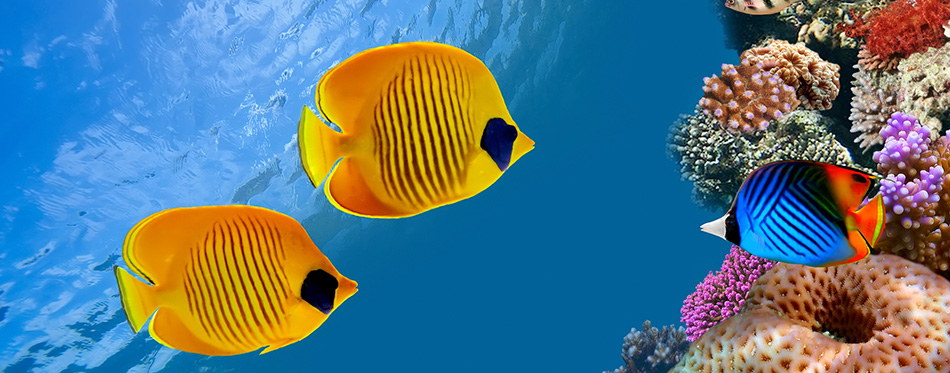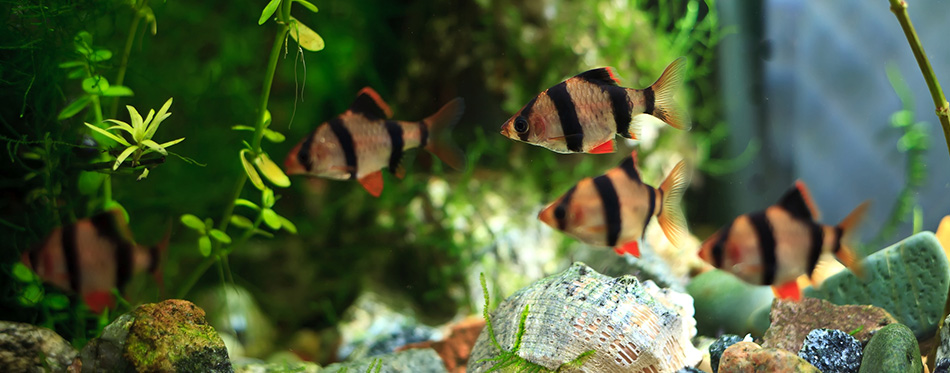Like most animals, fish need a little rest and relaxation at the end of a busy day swimming, foraging, hunting, and socialising. But without the ability to lie down and snuggle up, our scaly friends don’t exactly ‘sleep’ in the conventional sense. Fish sleep is a surprisingly tricky subject to study, and to this day presents a mysterious challenge to marine biologists and other scientists.
Despite the gaps in our knowledge, what we do know about fishy sleep is fascinating. If you’ve ever wondered if, how, and when your aquarium inhabitants get their shut-eye, read on, as we dive into this unusual topic.
Why do Animals Sleep?
Before we get into exactly how and when our fishy friends enjoy nap time, it’s worth taking a moment to ask a more fundamental question: why do we need sleep, anyway?
As it stands, there is no easy answer to this question, but sleep scientists have suggested a number of possibilities over the years. At a basic level, sleep gives the body a chance to rest and recuperate. Both body and brain are refreshed by this period of inactivity, which improves focus, and energy levels. Sleep may have come about to allow early animals to conserve energy at night, when hunting or foraging wasn’t possible. Another theory suggests that sleep is necessary to recover from the day, and process a wealth of sensory information.
During sleep, levels of glycogen in the brain seem to be topped up. Glycogen is a type of sugar that can be easily stored in the body – usually in the liver and muscle tissue. Glycogen is usually broken down into glucose, when muscles need this sugar for respiration. In the brain, though, recent studies suggest that glycogen is important in the process of learning, as well as memory formation. During waking hours, levels of brain glycogen gradually fall, so sleep may be necessary to bring them up again, maintaining the ability to learn and remember.
Whatever occurs during sleep, experiments show that the process is vital. For instance, researchers found that sleep deprived rats lose weight, can’t regulate their body temperature, and become more prone to infections. After just a few weeks, rats will actually die of sleep deprivation.
This surprising evidence implies that sleep plays a role in a huge array of bodily functions – from learning, to staying warm, to fighting off infection. Clearly, animals need sleep to survive – so how do fish manage underwater?

How Fish Sleep
Obvious as it might sound, fish differ from us mammals in some pretty fundamental ways. They extract their oxygen from water, not air, have fins rather than legs, and scales rather than hair. Other differences aren’t so easy to spot.
Because they don’t have certain body parts, fish can’t be said to ‘sleep’ by the standard definition that’s usually applied to mammals. This definition of sleep requires animals to close their eyes, and shut down the neocortex of the brain. Since the vast majority of fish don’t have a neocortex or eyelids, saying that they ‘sleep’ is a little misleading.
That being said, most fish do have their own version of ‘sleep’ – periods of relative inactivity and rest. During these stretches of recuperation, fish exhibit a slowed metabolism, reduced activity, and a lowered heart rate. Fish don’t ‘shut down’ during sleep quite as thoroughly as humans and other mammals. Instead, they enter what often looks like a ‘daydream’, which leaves them dopey but still responsive enough to threats for a quick getaway.
One key difference between fish and mammalian sleep is that fish don’t experience periods of REM (Rapid Eye Movement). As the name suggests, REM sleep occurs when an animal’s eyes move rapidly. This type of sleep is also characterized by increased brain activity and the inhibition of motor functions. In humans and other mammals, dreaming occurs during REM sleep. We don’t know exactly why so many animals exhibit REM sleep, but it is believed that the process is a kind of mental ‘exercise’ that prevents degradation in the brain. Perhaps fish don’t experience REM sleep because their less sophisticated brains don’t need it.
Check out our guide on Fish Bowls for more info.
How to Tell When Fish are Sleeping
Different types of fish will exhibit different behaviors when they’re sleeping, but there are a few fairly universal signs to look out for:
- Lack of Movement
Most fish will dash and dart around for large portions of the day, so when they become still, drifting with the current, chances are, they’ve fallen asleep. Different species maintain different levels of mobility during sleep, but most will exhibit occasional tail flicks to keep themselves balanced.
- ‘Nesting’ Behavior
Many species of fish will make themselves a cozy hiding spot when it’s time to catch some z’s. You may notice them burrowing into the sand or pebbles at the bottom of their tank, or simply resting atop this surface. Other species retreat among areas of dense plant growth or tuck themselves into a hole in a nearby rock.
- Dopey Appearance
When fish sleep, their mental faculties are significantly reduced. This means that they’re not as responsive to external stimuli as they would be while awake. If your fish seems a little zoned out – perhaps ignoring the movement of others, or drifting aimlessly – they are most likely asleep.
Without eyelids to close, fish sleep can be tough to identify. For a more accurate picture, you can always look into the sleep behaviors displayed by the species of fish you keep specifically.
Fish Sleep Patterns
Now that we have an idea of why fish sleep, and how they do it, the next logical question to ask is when, and how often, they sleep.
Frustratingly, there is no single answer to this question – fish are a diverse bunch, and their sleeping habits can vary significantly. Most species of fish that you’re likely to find in an aquarium are active during the day, and sleep at night – just like us, humans. Their sleeping patterns are often reinforced by human behavior, as tank lights are typically switched off during night-time hours. For more options, check out our detailed review of the best fish tanks.
How long a fish will sleep also depends on their species along with other factors such as how active they’ve been. In the wild, when fish migrate, spawn, or mate, their sleeping habits can also vary from the norm.
Believe it or not, fish can suffer from sleep-related ailments just like humans. For instance, zebrafish exhibit signs of insomnia – taking a long time to fall asleep, and not sleeping for very long – when they lack hypocretin receptors. Hypocretins help maintains alertness in the brain, and when they aren’t properly produced or detected, sleep disorders can develop.
Because it’s quite easy to tell when a zebrafish is asleep – they lower their tail and stop moving about – the animal has been incredibly useful to scientists investigating sleep, and sleep disorders.
Take a look at our review of Aquarium Heaters for more info.
Species Variation
Although almost every vertebrate requires some sort of sleep, this rule is by no means universal. For instance, fish such as sharks and tuna, which swim continuously, don’t seem to sleep at all. The jury is still out on why these species, in particular, don’t need any shut-eye, but one prominent theory suggests that it’s because they don’t need to process sensory information since they are exposed to unchanging scenery day after day. This theory is backed up by the fact that most naturally blind, cave-dwelling fish don’t seem to sleep either.
Even when fish do sleep, nap-time behaviors can differ significantly between species, for instance:
- Parrot Fish
It can be difficult to tell whether certain species of fish are awake or asleep – not so with the parrotfish. These peculiar creatures produce their very own ‘duvet’ – a mucus cocoon – from glands on the inside of their gills. This unpleasant but useful layer not only keeps the parrotfish cozy, but it also shields them from parasites and prevents their scent from reaching the noses of predators.
- Spanish Hogfish
As we’ve mentioned, most fish stay responsive to potential danger, even as they sleep. One notable exception is the Spanish hogfish. These colorful fish are actually very deep sleepers, and you can practically lift them out of their tank before they show any signs of waking up. It’s best to avoid doing this, however, since stress isn’t good for your fish.
- Jellyfish
In recent studies, the humble jellyfish has proven that you don’t need a brain to sleep after all. Researchers found that when jellyfish floated upside down in the water, they were less active and less responsive to stimuli. When kept ‘awake’, the jellyfish even showed signs of sleep deprivation!
You may also like our article on Protein Skimmers.
Conclusions
So, do fish sleep? The answer is a resounding ‘yes’. Almost every species of fish exhibits some form of sleep – even brainless jellyfish can enjoy a relaxing slumber.
Although fish sleep is quite different from our own, it appears to be necessary for a happy and healthy aquatic life. Studies have shown that fish can become sleep-deprived, and their sleeping patterns are influenced by what we do as owners, too.
Source:
- Do Goldfish Sleep? – PetMD


